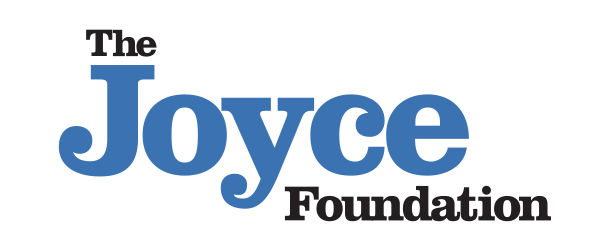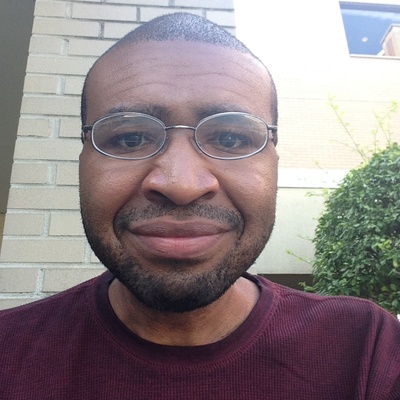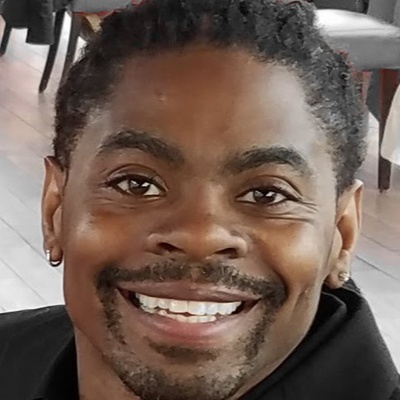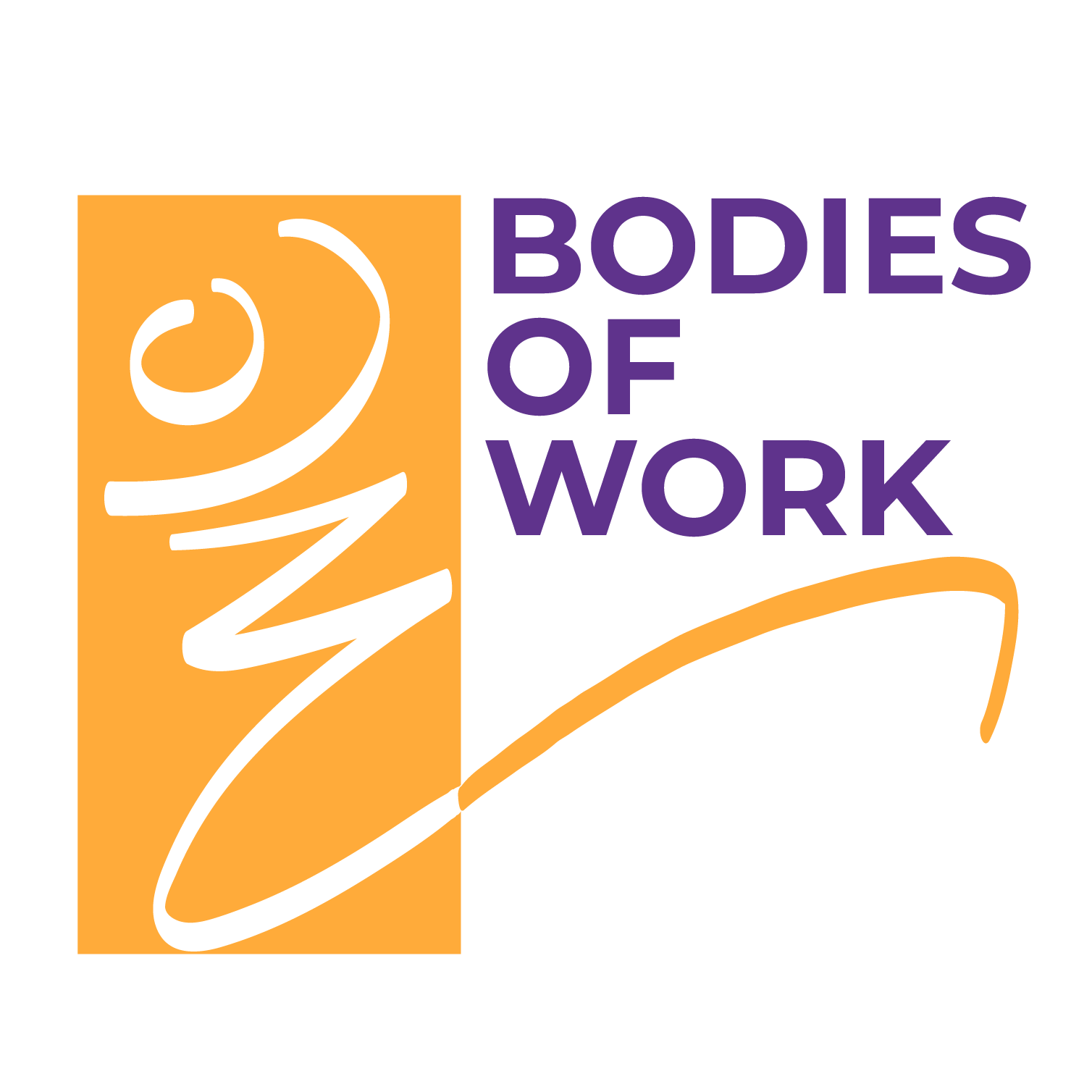Activism on Screen and on Canvas
Fall 2022
Anita Gonzalez, a writer, director, and professor at Georgetown University, speaks with Justin Cooper and Antonio Davis, two visual artists who have participated in the 3Arts/Bodies of Work Residency Fellowships. Justin Cooper is a Black visual artist, disability advocate, and filmmaker who highlights accessibility issues in Chicago through his work, including the documentary film "The Wheelchair Chronicles." Antonio Davis is a painter, videographer, and activist whose art spans various subjects, including landscapes and portraiture.
This is a transcript of the closed captions from the video conversation.
Anita Gonzalez: Hi, my name is Anita Gonzalez and I'm a writer, director, and educator. I'm also a professor of Performing Arts and African American Studies at Georgetown University and co-founder of their Racial Justice Institute. Today, I'm in conversation with two artists who have participated in the 3Arts/Bodies of Work Residency Fellowships. This is part of a series of conversations designed to promote the art of Deaf and disabled artists and their experiences in the disability culture community.
Justin Cooper is a Black visual artist and disability advocate who's been working in art, filmmaking, and photography professionally since 2012. He is the creator of the documentary film "The Wheelchair Chronicles," is president of the Young Professional Council to Access Living, and founder of the media company, Cooper Industries, which focuses on his filmmaking, film production, and photography work.
Antonio Davis is a Chicago-based painter, videographer, and activist whose passion has always been art. After becoming quadriplegic, he was introduced to mouth painting and since then has developed his talent and joined the Mouth and Foot Painting Association.
Welcome to the two of you. I've had a chance to peruse and look at your websites and all of the amazing products that you've created, so I'm really thrilled to be in conversation with you today. I'm gonna start off by asking Justin, if you could take a moment to describe your art. I'm interested in the things that drive you creatively, what's important to you and your work as an artist. Tell me a little bit about yourself, Justin.
Justin Cooper: So my work is primarily centered around the work that I do as a disability advocate and an activist, highlighting like accessibility issues within the city of Chicago. And so like, in my travels I see a lot of issues that come forth in terms of when it comes to accessibility, the work that I've done, you know, especially in the last couple of years during the pandemic is really highlighting what I see from an accessibility standpoint and what I see from an inaccessibility standpoint. I feel like a lot of people don't really talk about, you know, these issues and don't really see them or pay attention to them. And with the work that I do with my photography work, I really want to highlight those issues so that we can drive the conversation when it comes to accessibility issues.
The Wheelchair Chronicles by Justin CooperAnita Gonzalez: Yes, I really appreciate your film, for example, "The Wheelchair Chronicles," because it gives us a real insight into what it means to have places that are not as accessible as they should be to other people. Antonio, what about you? Can you take a moment to describe your art?
Antonio Davis: Well, my art centers around various different subjects since I've been painting professionally for the last 13 to 14 years. So it depends on what state of mind I'm in. If I'm going to paint commercially, I work with a lot of landscapes, which my landscapes usually depict beauty and serenity and something to make you think about, something to soothe your mood. I call it the power of the healing arts, because if you look at some of my pieces, you know, you can meditate, you can go into a different state, and uh, I call it, just take your cares away, with some of those landscapes and some of the rocks, the movements of my work. And then I go into portraiture. I have a lot of portraits that are really meaningful, so when I'm in a state of activism, like I have a piece by Muhammad Ali that I call "Courage," and with that piece, I wanted to highlight the courage that it took for Muhammad Ali to stand up against our country, our government. So I have so many different aspects of my art that I tend to go into, it depends on the state that I'm in.
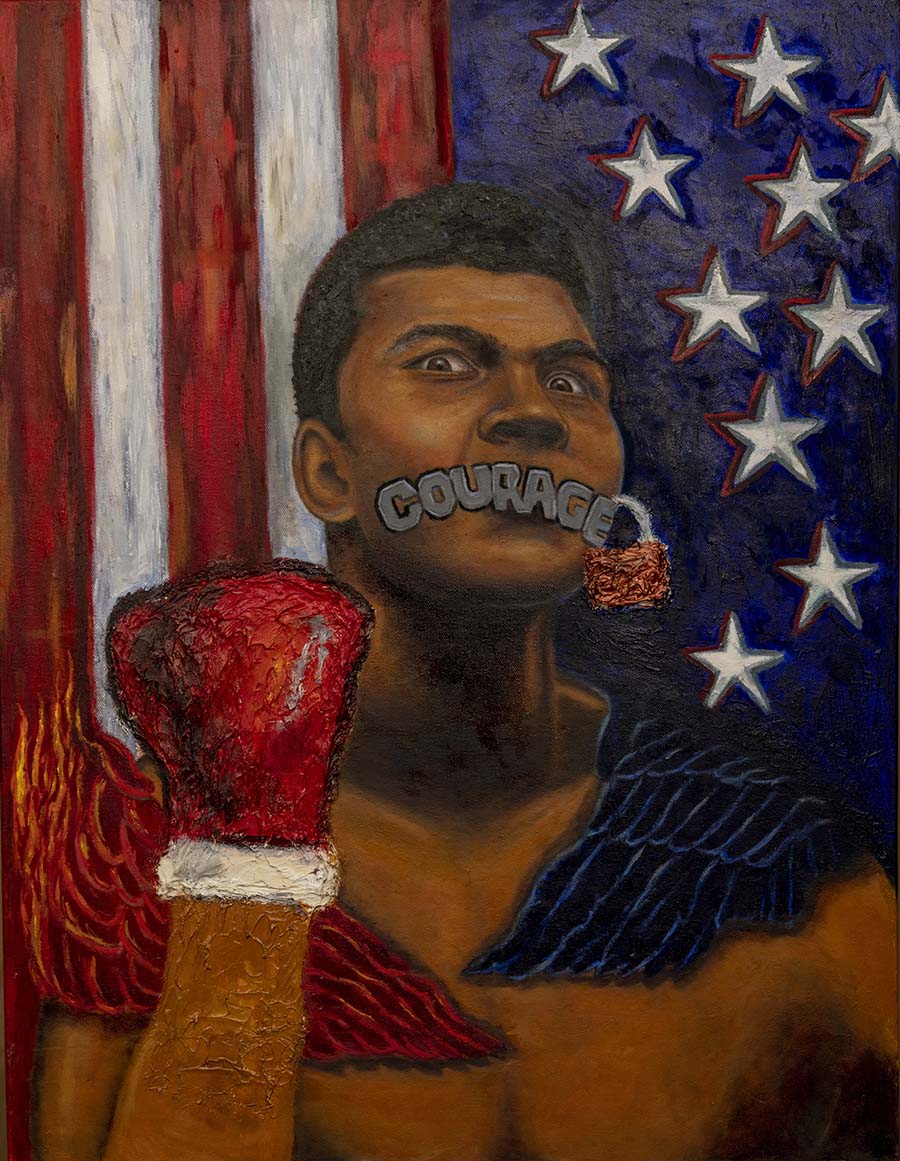 Muhammad Ali portrait by Antonio Davis
Muhammad Ali portrait by Antonio Davis
Anita Gonzalez: I think it's interesting because you have such a broad range of subject areas. Right, you paint all different kinds of people and all kinds of places, and also sometimes in more subdued colors and sometimes in bright colors. It's really impressive to see someone who has such a broad range of what they are able to paint, and I think that speaks to the possibilities that one has in life. So Antonio, drawing upon your experience in the 3Arts/Bodies of Work Residency Fellowship, can you talk about how your work relates to disability aesthetics? It could be in terms of content or form or creative process. In which ways do you see your work in conversation?
Antonio Davis: With that fellowship, I was able to really narrow down and focus on disability culture and my portrait work. I was commissioned to do a portrait of Marca Bristo, who was the founder and CEO of Access Living. And she founded Access Living, which is a great, great, beautiful organization that helps people with disabilities get out of nursing homes and have independent living.
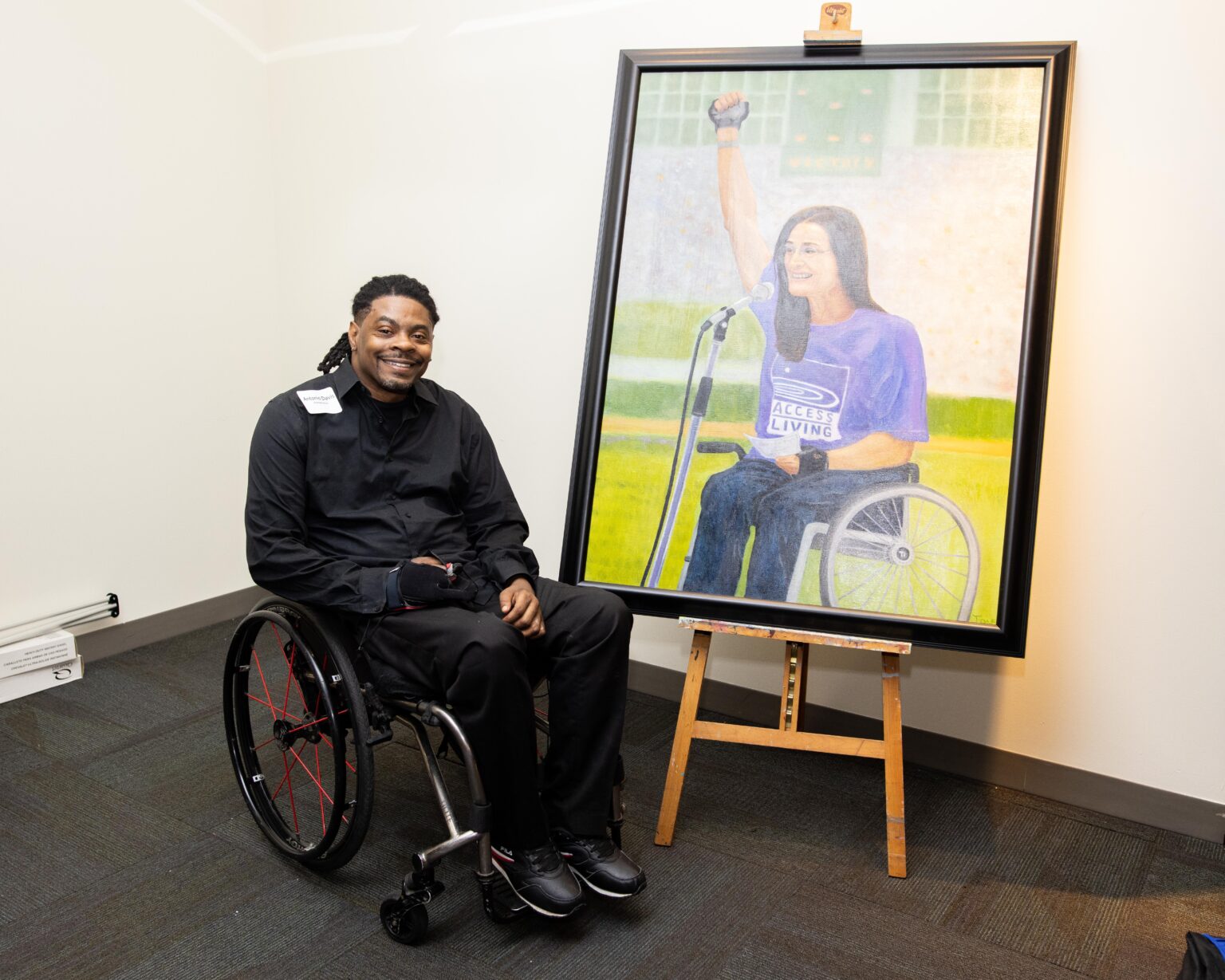 Marco Bristo portrait by Antonio Davis
Marco Bristo portrait by Antonio Davis
Antonio Davis: I was actually in a nursing home like 20 years ago, so I felt full circle to come back around and get that commission from Access Living, to paint somebody who literally helped thousands of people get out of nursing homes.
So I created that portrait and I talked about that in my fellowship, and also I talked about the other portraits of disabled recognized celebrities and figures who just stood up for disabled rights. So that fellowship was great for me. It helped me hone in what I was looking to do during that fellowship and at the time of my career.
Anita Gonzalez: Justin, would you talk a little bit about your experience with the 3Arts/Bodies of Work fellowship?
Justin Cooper: I think for me it's two things, and I think it's similar to Antonio. Being a part of this fellowship really connected me to a lot of disabled artists in the community and it really made me feel like I was actually a part of that community, and so for the longest time I always felt that I was kind of doing things by myself or that the work that I was doing like wasn't really being recognized, but through this fellowship I found out that there's so many people who, one, know my work, you know, and two, are like thrilled to be wanting to collaborate with me and wanted to talk more about what we can do for the disabled art community here in Chicago, and just like being in awe of so many cool, like badass artists who are really cool, and knowing who I am, and, like yeah, 'you're a badass just like all of us.' And so, having that community through this fellowship has just been so amazing.
Justin Cooper:The second thing for me was I learned so much about myself and how I do my photography work and really the process that goes into it. There's a physicality process that comes into it, there's ways where I travel in my wheelchair trying to get perfect shots and trying to navigate through areas that are really difficult for me as a wheelchair user and making me really think about going forward, how I present my photos and how I showcase them and learning about the work that I do to put this all together. And so learning more about the process has really elevated what I feel like where my work is currently at.
Anita Gonzalez: It's really interesting the way that both of you are talking about the Chicago disability arts community and especially the things that it's offered to you. Do either of you want to elaborate on what things you gained by being specifically in Chicago and being connected through 3Arts?
Antonio Davis: Yes, for me, being here in Chicago has been very, very helpful because Chicago is one of the leading cities in disability culture and in disability foundation. So, to draw off my experience, I've worked with a lot of different foundations that are disabled-oriented, who put disability first, like the Obama Foundation, and definitely Shirley Ryan's Ability Lab, that's the hospital that I literally rehabbed at and learned about mouth painting. So, for me to be here in Chicago was a blessing that was bestowed upon me and to learn about all the different artists in the communities. I have known a lot of, like Justin say, badass artists. I have watched me, Reveca [Torres], and Mariam [Pare] have came up through the ranks together. I mean that's just, that's just a few. Over the years, we have watched each other grow and shared and enjoyed each other and cheered each other on. And then to get to meet Justin and the rest of the new artists that are coming in and kicking ass, I love it.
Anita Gonzalez: So, I'm curious because each time we've spoken or met, you talk about Justin, and he talks about you. And I wonder what the two of you talk about when you talk together.
Justin Cooper: I'm always like in awe of the work that Antonio does, you know, and learning his connection, you know, to the disability arts community, you know, because we met, um, I think we met like a few months ago for one of his workshops. It was such a connection that we had with each other because you know, one, we're like, we're Black disabled artists, and you know being able to share our own stories of being Black and disabled and being able to share that with each other, I always felt like we had a strong connection from there. And being able to talk to each other about different issues happening in the community, I think that's something that, you know, me and him have really had a strong connection. Being able to be a part of this with him is something that, like, it's just really good for me because I see so many of the awesome things that he's done, you know, many of his paintings, and his painting of Marca is something that really stood out to me because I have a connection with her and I have a connection through Access Living. And so, yeah, being able to share that's just been such an amazing experience for me.
Anita Gonzalez: Have you had any challenges gaining access, funding, or training within your fields? I know that Antonio was talking about learning about mouth painting from the Center, and how about you, Justin, how about training?
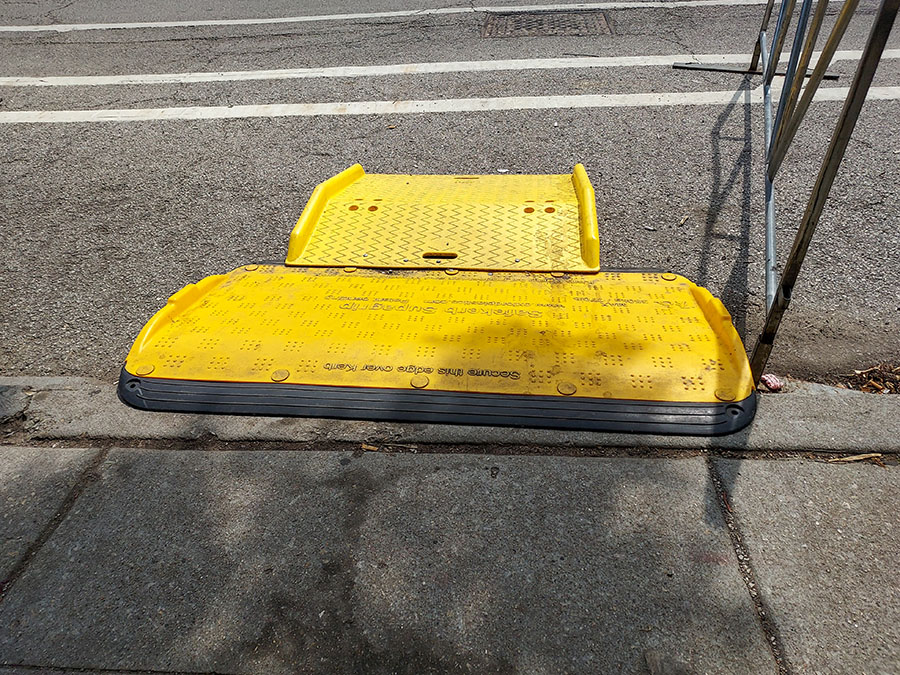 Inaccessible by Justin Cooper
Inaccessible by Justin Cooper
Justin Cooper: I've actually been learning from myself, really learning on the fly, just through my travels. It's a learning process for me because now like I'm really working to get my work out there, you know, more for people to see. I'm still learning about like trying to apply for grants and learning how to write grants and doing all of these different things. It's been an interesting journey trying to put that all together and trying to find it, but I think overall for me, I was just really training on my own, just through my travels in my wheelchair. That's kind of been guiding me through the past, you know, during this time as an artist.
Anita Gonzalez: Okay, thank you for that. Justin, do you have a question you'd like to ask Antonio?
Justin Cooper: Yes, I wanted to know from you what is the process that you go through when it comes to either creating a new painting or like on an existing one like for example your painting of Marca. What was your process going through that?
Antonio Davis: My process for painting Marca was kind of extensive. I totally went through her whole life story. I looked back at her journey and her life experience so I can really try to embody what she represented, not only for the disability community but also for her family. Because I wanted that portrait to really resonate with the people that loved her, and she loved them. I wanted that piece to really be special, you know. Then I went through my normal workflow, Justin. I mocked up a couple of studies, a couple of color studies, a couple sketches of composition, what would be most powerful, because she was a giant in our community. So when I came up with that, that pose and her fist handing up, and she was at Wrigley. I used a reference, you know, I had a little reference photo that when she was at Wrigley and she was just like, 'disability rights are human rights.'
Justin Cooper: Yes.
Anita Gonzalez: Right, yes!
Antonio Davis: You know I just, I just went through it, man. I actually did a time lapse of it, did you see the time lapse? Of me painting her?
Marca Bristo Original 36x48 Life Size Oil Painting by Antonio DavisJustin Cooper: I saw that!
Antonio Davis: So I was like, in my zone. And then I made it huge. She was such a giant that I painted that portrait. It was 48 by 36. So when you walk in Access Living, it's right in the front and she's right there, like, her spirit is there. She is like victory. I titled it "Victory."
Because she made her dream come to life when she founded that organization. I'm very proud of that, yeah, I'm glad you asked me that question.
Justin Cooper: I'm glad that you said that because, as a person that has, you know, volunteered at Access Living through different organizations and being the current President of their Young Professionals Council, you know, her spirit still lives on at Access Living, and so I see that you know, through that painting. And I see that her spirit is just living on through Access Living and through the entire disability community, and so, like, that painting means so much to me and I know that it means so much to so many people within the disability community and I thank you for that, brother, because that's just so, it's just so, it's so powerful.
Anita Gonzalez: So, I have one last question for the two of you and it is, what are you dreaming about for your own practice or for the disability arts movement?
Antonio Davis: For me, I'm a work in progress, right now [laughter]
Anita Gonzalez: as we all are...
Justin Cooper: yeah, absolutely.
Antonio Davis: So, I'm just, right now I'm working, I'm thinking about new ideas, new ways to come up, new concepts to move forward, new paintings, new styles, new people to inspire and just, just keeping it moving forward. I've got a lot of opportunities ahead of me, a lot of things that I still want to look back on and improve and keep connecting. I love that I got invited to this fellowship through 3Arts. I wasn't expecting it, but it was wonderful.
Justin Cooper: What am I dreaming about? That's a lot to think about. I'm uh, my mind is all over the place when it comes to my dreams and hopes for the future. Uh, one of my main hopes is really continuing to expand on the work that I do as a photographer and really continuing to highlight a lot of issues that pertain to people within the disability community. You know, through this fellowship, it really helped me grow and really helped me tell the story of my experience as a disabled person. You know, being able to, like, you know, I never dreamed you know. Like after the fellowship I actually had a chance to showcase some of my photography through an exhibition at UIC's Gallery 400, and that's something that I never really dreamed about and, like, it happened, and being able to see the results of it and hearing from folks who are just really so proud of the work that I'm doing and really continuing to spread awareness about disability rights.
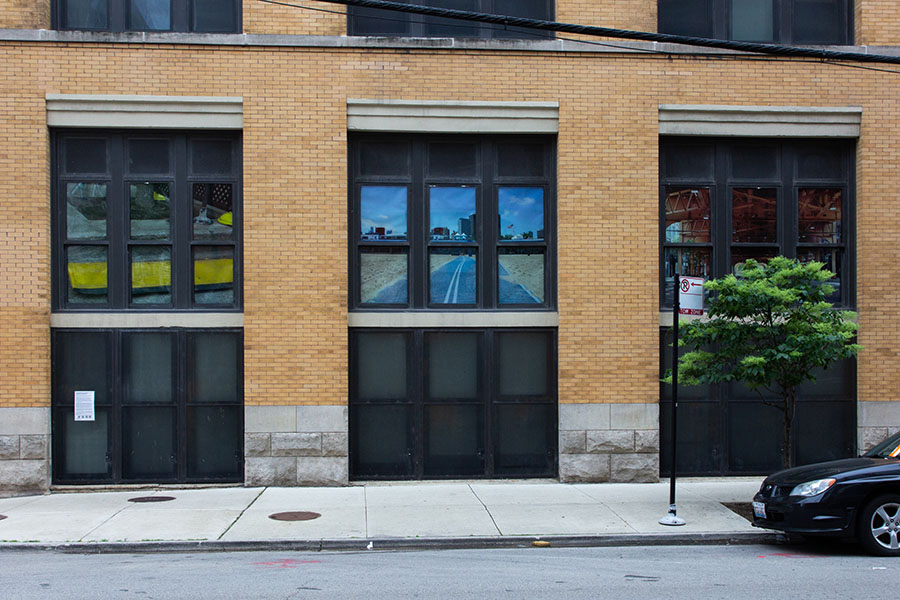 Through My Lens by Justin Cooper at Gallery 400
Through My Lens by Justin Cooper at Gallery 400
And so, I want to continue to do that and I think, you know, as the work that I do as an advocate and activist, I really want to create a legacy for future generations, future disabled artists in this community and really giving them a space to be able to grow, to be able to find themselves as an artist. And so, I want to really continue to help grow this community because there are so many amazing people within it from various backgrounds who are just doing great things, and I want to continue to build upon that so that we can continue to have future generations of disabled artists just doing badass things in the community.
Anita Gonzalez: I'm very encouraged by the work that both of you are doing. In this way, you know, I see the activism, I also see the camaraderie between the two of you. Well, I think those are all the questions I have. I'm really interested in how the two of you, because you're both working with visual arts, creating, developing audiences, but it seems as if the audiences are drawn to the work that you're doing because of its beauty and its quality and for what it helps people to understand about disability life and just life in general. So, I thank you for all of that. You guys are awesome. It's wonderful to see you smile.
Justin Cooper: Thank you.
The Disability Culture Leadership Initiative and 3Arts/Bodies of Work Residency Program are supported in part by grants from
the Joyce Foundation and the National Endowment for the Arts.
